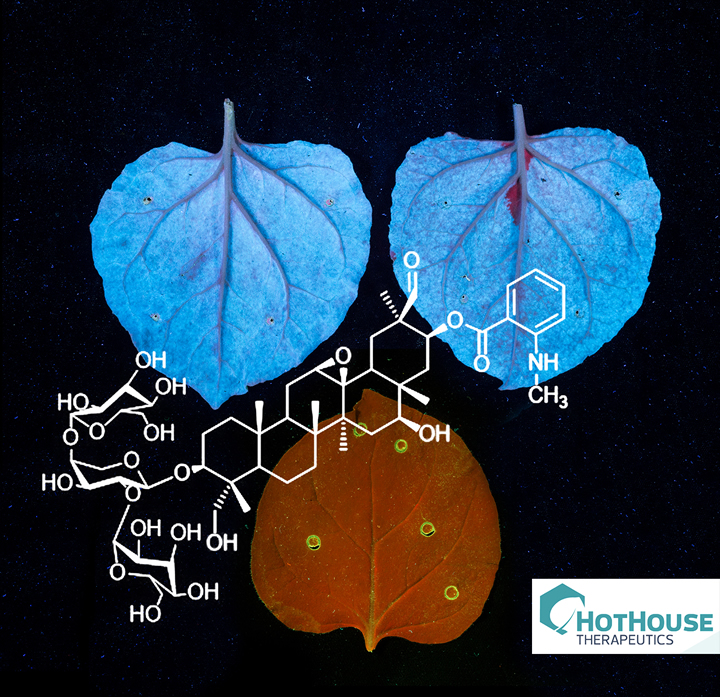PLANTS AS BIOFACTORIES – A HIGH VALUE OPPORTUNITY FOR VERTICAL FARMING?

As technologies emerge that enable a wide range of naturally occurring medicinal compounds to be reproduced by a host plant within a controlled environment, is it time to review the use of plants as biofactories? Innovation facilitators Agri-TechE are partnering with the life-sciences network OneNucleus to explore the market potential of using plant factories to mass produce rare drugs.
Contributing his expertise to the workshop is Malcolm Skingle, Director of Academic Liaison at GSK, who has seen the evolution of natural products over many years. GSK has dipped in and out of plant-derived pharmaceuticals and used alkaloids as starting points for novel chemistry programmes.
Malcolm says the key challenges with natural products have been issues around purifying the active ingredients, and ensuring consistency of potency and yield: “The pharmaceutical industry has been fickle in the area of natural products as the yields have been low. However, the technology moves on and I have, through GSK and work with BBSRC, kept a watching brief on developments.”
Technologies developed at the John Innes Centre (JIC), a member of Agri-TechE, have been used by Canadian company Medicago to produce proteins for vaccines using Nicotinana Benthaminana (tobacco) plants as bioreactors.
The company used the technology to develop a COVID-19 vaccine candidate in collaboration with the Canadian government, using an adjuvant manufactured by GSK. Unfortunately, the first Canadian-made vaccine was rejected by the UN due to the involvement of the tobacco industry, however other plants – including the potato – also have potential as biofactories.
Dr Belinda Clarke, Director of Agri-TechE, observes: “The commercial exploitation of technologies developed at JIC show there is market potential for production of high value active ingredients in plant biofactories, but there are still many elements to be co-aligned, not least the regulatory environment.”
Adjuvants are a potential opportunity for biofactories – they boost the immune system and are a critical component of many vaccines, but only a few have been approved by the US Food and Drugs Administration.
HotHouse Therapeutics aims to explore this niche. It was spun out from JIC following a breakthrough from Professor Anne Osbourn’s lab that created an understanding of the biosynthesis of the vaccine adjuvant QS-21, used in vaccines for Covid 19, malaria, shingles, and RSV.
QS-21 is currently extracted from the bark of the Chilean Soapbark Tree and a single gram of the pure material costs more than $100,000. However, the tree bark also contains even more potent molecules that are present in such tiny amounts that they cannot be extracted at commercial scale.
HotHouse Therapeutics’ technology has the potential to synthesise these hyper-potent molecules in a biofactory, removing the need for extraction from wild trees and addressing a significant unmet need in the vaccine industry.
Martin Stocks, co-founder of HotHouse Therapeutics, explains: “HotHouse Therapeutics has the capability of isolating and reconstructing entire biosynthetic pathways that generate metabolites/chemicals of interest, from plants or other organisms.
“We can not only produce a compound of interest in our plant biofactory but also modify the pathway to improve its properties.” The company views vertical farming technology companies as a key element for the future development of these innovations.
Tony Jones from OneNucleus comments: “By bringing together pharma and agri-tech we plan to explore the current obstacles and the innovations needed to help realise the potential of this exciting prospect.”
The Agri-TechE event ‘Plants as biofactories, a growing opportunity for vertical farming?’ is an online event at 14:00 – 15:00 BST on 17th April 2024. Malcolm Skingle and Martin Stocks will be joined by Steve Taylor, Founder and Director of Celbius, and the presentations will conclude with a discussion and outline of the next steps.
Find out more at agri-tech-e.co.uk.
Comments (0)
This post does not have any comments. Be the first to leave a comment below.
Featured Product

